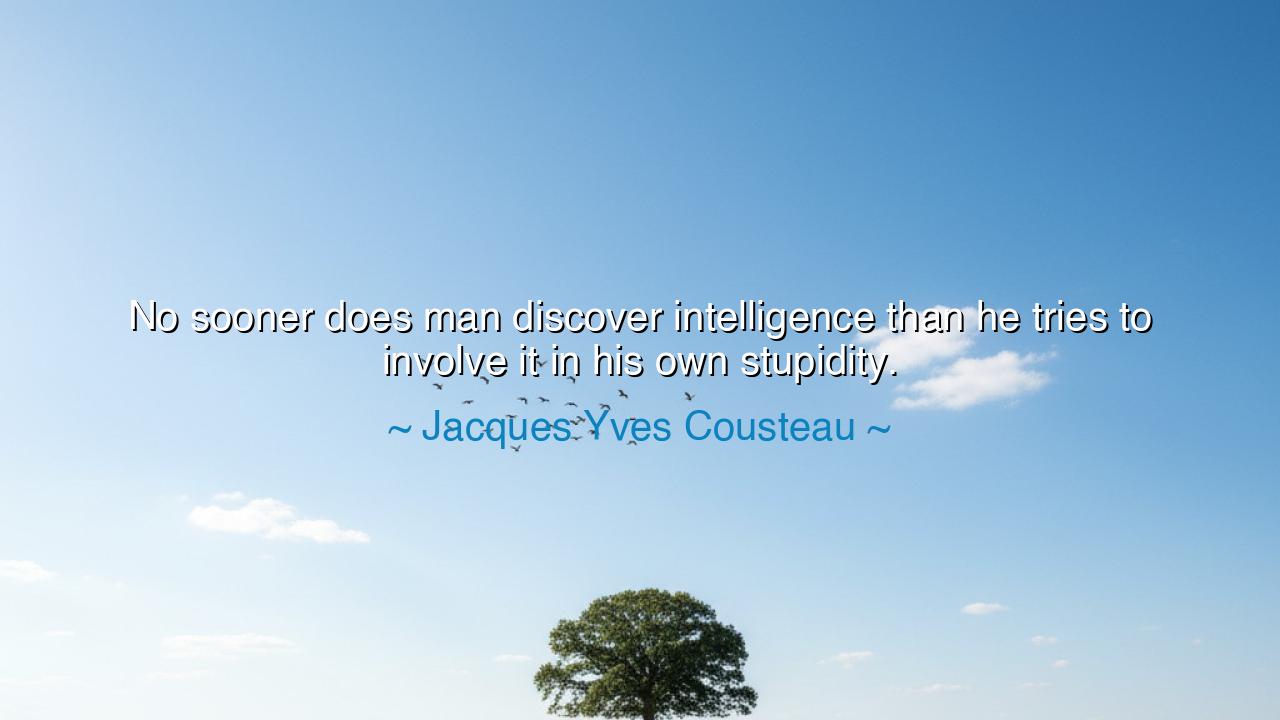
No sooner does man discover intelligence than he tries to involve
No sooner does man discover intelligence than he tries to involve it in his own stupidity.






In this sharp and timeless observation, Jacques Yves Cousteau, the explorer of the seas and the philosopher of the deep, reveals a paradox at the heart of humanity: “No sooner does man discover intelligence than he tries to involve it in his own stupidity.” These words rise like a tide of truth against the shores of pride. Cousteau, who dedicated his life to exploring the mysteries of the ocean and the mind, knew that the greatest danger to knowledge is not ignorance — but arrogance. The moment man uncovers a new spark of intelligence, he often seeks to use it not for wisdom, but for domination, excess, or destruction. Thus, Cousteau warns us: the light of discovery must always be tempered by the humility of conscience.
The origin of this quote lies in Cousteau’s lifelong observation of human progress — both its triumphs and its tragedies. As a scientist, inventor, and environmentalist, he watched as technology expanded humanity’s reach but not always its wisdom. The same species that could create submarines to explore the ocean’s depths could also fill those depths with pollution and death. The same intelligence that built spaceships could build bombs. In these contradictions, Cousteau saw the flaw in the human heart — that man, though brilliant, is also careless, quick to wield power without reflecting on its cost. His words were not a condemnation of intelligence, but a plea that knowledge must serve life, not vanity.
To say that man “involves intelligence in his own stupidity” is to point out how quickly knowledge becomes corrupted when divorced from morality. From the moment humans first learned to harness fire, they have stood at a crossroads — to use their gifts to build or to burn. Every invention, from the wheel to the atom, carries this double edge. Cousteau saw it in the industrial age, when machines that could ease human labor instead enslaved the earth; he saw it in the nuclear age, when the genius of science turned toward annihilation. The irony, he reminds us, is that stupidity often wears the mask of progress — it is not the absence of knowledge, but its reckless misuse.
History gives us many echoes of this truth. Consider Oppenheimer, the father of the atomic bomb, who upon witnessing the first detonation whispered from the Bhagavad Gita: “Now I am become Death, the destroyer of worlds.” His creation was a triumph of intelligence — a fusion of physics and imagination unlike anything before. Yet it became an instrument of horror. The same human mind that sought to understand the universe’s secrets turned its understanding into a weapon of despair. This is precisely what Cousteau mourned — that each time we rise to a new height of brilliance, we risk falling into a deeper abyss of folly.
But Cousteau’s words are not merely a lament; they are a call to consciousness. He reminds us that intelligence alone is not the measure of greatness — wisdom is. Intelligence discovers, but wisdom decides. Intelligence builds, but wisdom sustains. Intelligence asks what can be done; wisdom asks what should be done. Without the guidance of wisdom, every discovery becomes a danger. Like a ship without a compass, mankind drifts through his own brilliance, lost in a sea of his own making.
In the quiet of the ocean — that ancient mirror of the human soul — Cousteau saw a reflection of what could be: a species capable of harmony, not just invention. His quote is both warning and prophecy: that every generation must learn again to discipline its own genius. For intelligence, though powerful, is still a tool, and the tool takes the shape of the hand that wields it. A wise hand builds a home; a foolish one builds a cage. Thus, the question is not whether we are intelligent, but whether we are responsible with our intelligence.
So, my child, take this truth and keep it close: seek knowledge, but marry it to humility. When you learn, ask not only “how,” but “why.” When you build, build not only for gain, but for good. Remember that every discovery — every spark of intelligence — carries within it a duty. Let your mind be sharp, but let your heart be awake. Do not let your cleverness outgrow your compassion, for that is when brilliance becomes blindness.
For as Jacques Yves Cousteau reminds us, the tragedy of mankind is not that he lacks intelligence, but that he forgets its sacred purpose. True intelligence is not the conquest of nature or the accumulation of power — it is the harmony of understanding with reverence. When knowledge bows to wisdom, the world heals. But when it serves pride, the world burns. The choice, as always, is ours — whether to use our light to illuminate the path ahead, or to set fire to it.






AAdministratorAdministrator
Welcome, honored guests. Please leave a comment, we will respond soon